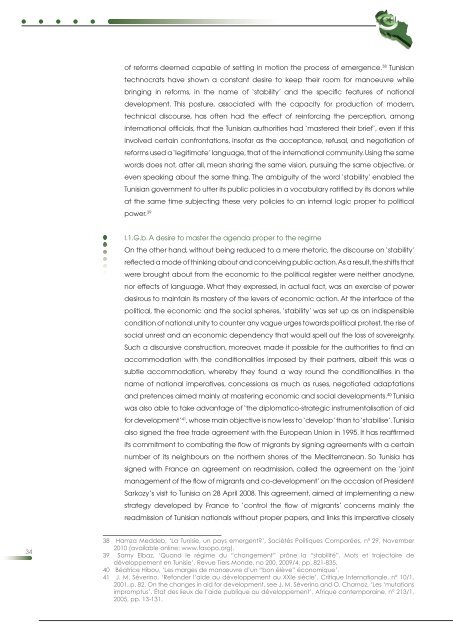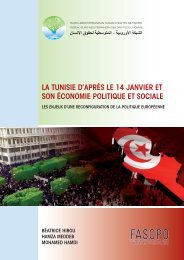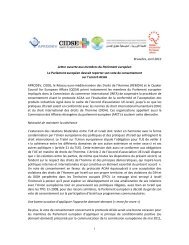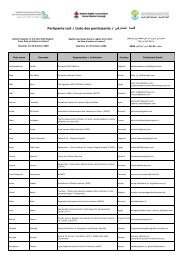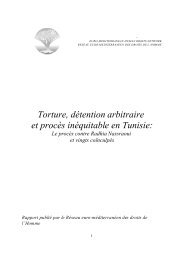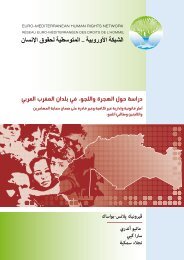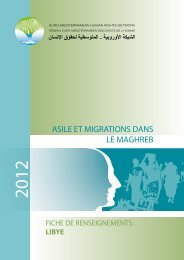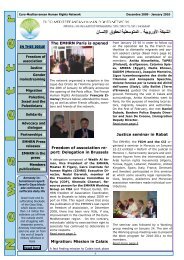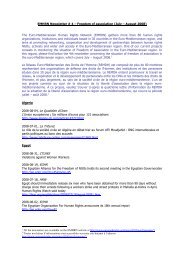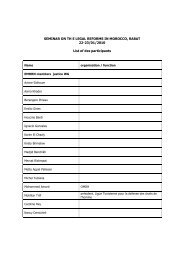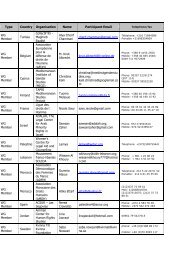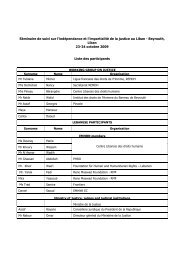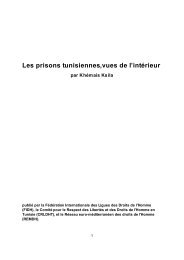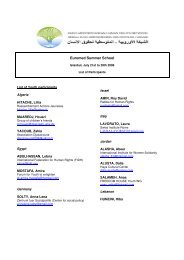tunisia after 14 january and its social and political economy - Refworld
tunisia after 14 january and its social and political economy - Refworld
tunisia after 14 january and its social and political economy - Refworld
Create successful ePaper yourself
Turn your PDF publications into a flip-book with our unique Google optimized e-Paper software.
of reforms deemed capable of setting in motion the process of emergence. 38 Tunisiantechnocrats have shown a constant desire to keep their room for manoeuvre whilebringing in reforms, in the name of ‘stability’ <strong>and</strong> the specific features of nationaldevelopment. This posture, associated with the capacity for production of modern,technical discourse, has often had the effect of reinforcing the perception, amonginternational officials, that the Tunisian authorities had ‘mastered their brief’, even if thisinvolved certain confrontations, insofar as the acceptance, refusal, <strong>and</strong> negotiation ofreforms used a ‘legitimate’ language, that of the international community. Using the samewords does not, <strong>after</strong> all, mean sharing the same vision, pursuing the same objective, oreven speaking about the same thing. The ambiguity of the word ‘stability’ enabled theTunisian government to utter <strong>its</strong> public policies in a vocabulary ratified by <strong>its</strong> donors whileat the same time subjecting these very policies to an internal logic proper to <strong>political</strong>power. 39I.1.G.b. A desire to master the agenda proper to the regimeOn the other h<strong>and</strong>, without being reduced to a mere rhetoric, the discourse on ‘stability’reflected a mode of thinking about <strong>and</strong> conceiving public action. As a result, the shifts thatwere brought about from the economic to the <strong>political</strong> register were neither anodyne,nor effects of language. What they expressed, in actual fact, was an exercise of powerdesirous to maintain <strong>its</strong> mastery of the levers of economic action. At the interface of the<strong>political</strong>, the economic <strong>and</strong> the <strong>social</strong> spheres, ‘stability’ was set up as an indispensiblecondition of national unity to counter any vague urges towards <strong>political</strong> protest, the rise of<strong>social</strong> unrest <strong>and</strong> an economic dependency that would spell out the loss of sovereignty.Such a discursive construction, moreover, made it possible for the authorities to find anaccommodation with the conditionalities imposed by their partners, albeit this was asubtle accommodation, whereby they found a way round the conditionalities in thename of national imperatives, concessions as much as ruses, negotiated adaptations<strong>and</strong> pretences aimed mainly at mastering economic <strong>and</strong> <strong>social</strong> developments. 40 Tunisiawas also able to take advantage of ‘the diplomatico-strategic instrumentalisation of aidfor development’ 41 , whose main objective is now less to ‘develop’ than to ‘stabilise’. Tunisiaalso signed the free trade agreement with the European Union in 1995. It has reaffirmed<strong>its</strong> commitment to combating the flow of migrants by signing agreements with a certainnumber of <strong>its</strong> neighbours on the northern shores of the Mediterranean. So Tunisia hassigned with France an agreement on readmission, called the agreement on the ‘jointmanagement of the flow of migrants <strong>and</strong> co-development’ on the occasion of PresidentSarkozy’s visit to Tunisia on 28 April 2008. This agreement, aimed at implementing a newstrategy developed by France to ‘control the flow of migrants’ concerns mainly thereadmission of Tunisian nationals without proper papers, <strong>and</strong> links this imperative closely3438 Hamza Meddeb, ‘La Tunisie, un pays emergent?’, Sociétés Politiques Comparées, n° 29, November2010 (available online: www.fasopo.org).39 Samy Elbaz, ‘Qu<strong>and</strong> le régime du “changement” prône la “stabilité”. Mots et trajectoire dedéveloppement en Tunisie’, Revue Tiers Monde, no 200, 2009/4, pp. 821-835.40 Béatrice Hibou, ‘Les marges de manœuvre d’un “bon élève” économique’.41 J. M. Séverino, ‘Refonder l’aide au développement au XXIe siècle’, Critique Internationale, n° 10/1,2001, p. 82. On the changes in aid for development, see J. M. Séverino <strong>and</strong> O. Charnoz, ‘Les ‘mutationsimpromptus’. État des lieux de l’aide publique au développement’, Afrique contemporaine, n° 213/1,2005, pp. 13-131.


